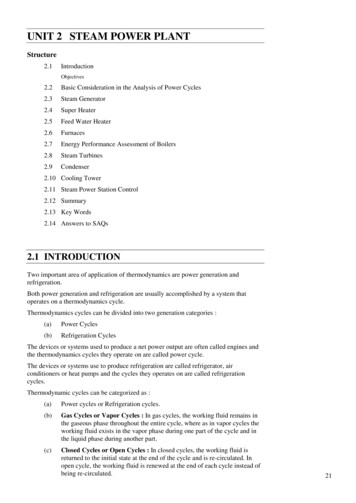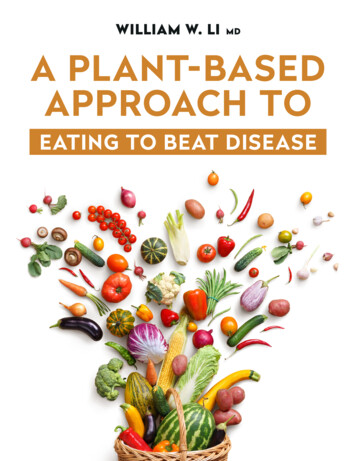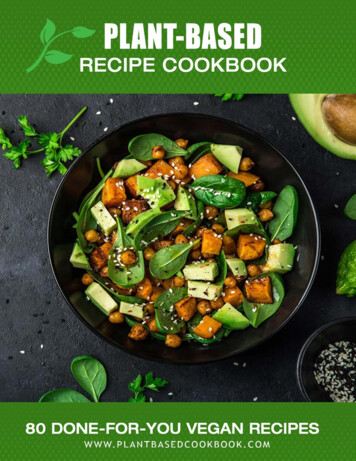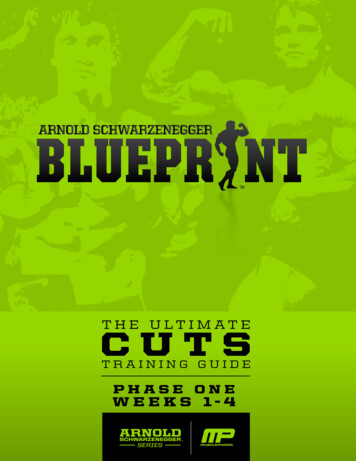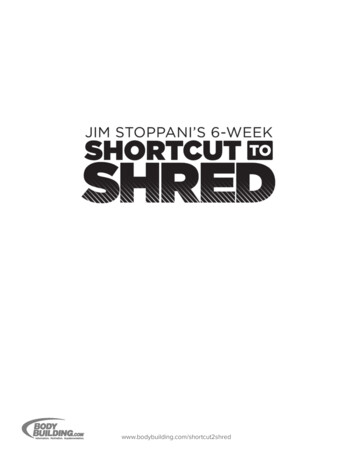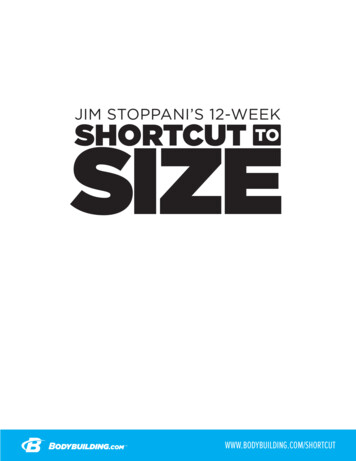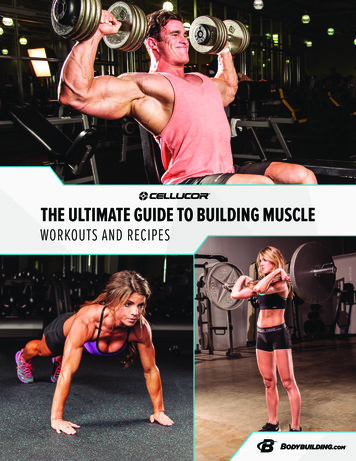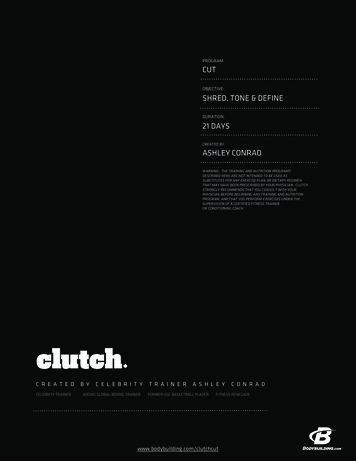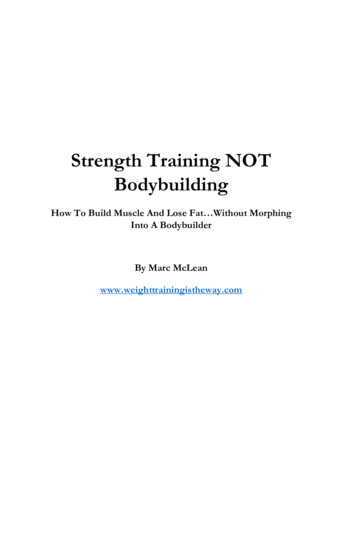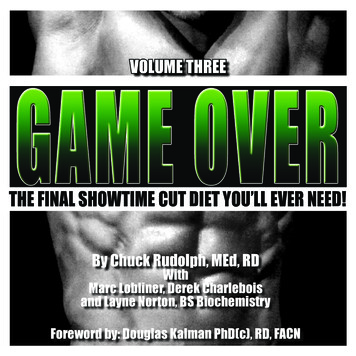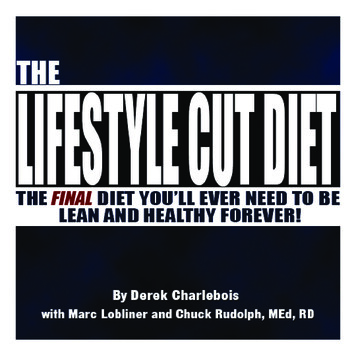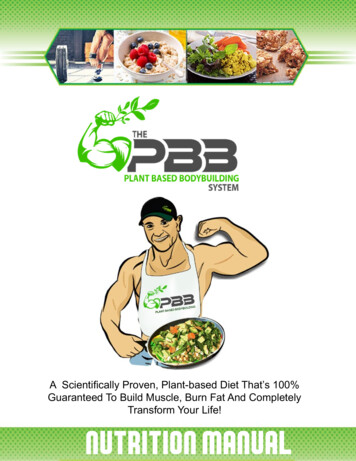
Transcription
A Scientifically Proven, Plant-based Diet That’s 100%Guaranteed To Build Muscle, Burn Fat And CompletelyTransform Your Life!nutrition manual
IntroductionThe words ‘plant-based’ and ‘bodybuilder’ don’t go too well together, dothey?What if I told you that couldn’t be any further from the truth?Proteins are the building blocks of muscle. And for years, we’ve been ledto believe that plant-based proteins are inferior to animal protein. A lotof people still believe that the protein obtained from a plant-based dietwill not be sufficient for the desired muscle growth.Well, times have changed.Today, there’s been a drastic increase in thenumber of people who have switched to a completely plant based diet.A plant-based diet has been proven time and time again to be muchhealther than any other diet that exists.So you’re looking to make the switch, but your concerned about whereyou will get a sufficient amount of protein from, then this book bookaims to answer that (and so much more).To simplify things, so if you are looking to pack on muscle mass, increasestrength or lose belly fat then there are certain factors we need to lookat first. Adequate protein, balanced carbohydrates, DHA and EPA (omega-3 fats) and Vitamin B12.Essentially, the same factors come into play whether you’re a plantbased body builder or one that relies on meat, and with this guide, Iaim to give you as much nutritional information as possible on how to goabout constructing your diet. At the end of this guide you will have theknowledge on what you will need to bulk (gain muscle, accompanied bya little fat), cut (lose fat without losing too much muscle), or maintainyour current bodyweight.
TABLE OF CONTENTSPART 1: Making The Transition To A Plant-Based DietPART 2: Benefits Athletes Experience After Eliminating MeatAnd DairyPART 3: Vegan Myths For Building MusclePART 4: Define Your Goals, Define Your PhysiquePART 5: Plant-Based Bodybuilding NutritionPART 6: Calculating Macros For Bulking, Cutting OrMaintenancePART 7: How To Calculate Your TDEE - Your Daily CalorieRequirementsPART 8: Calculate Your Macros: Proteins, Fats & CarbsPART 9: Micronutrients And SupplementsPART 10: Kitchen Supplies For Your Bodybuilding NeedsPART 11: How To Prep Your Meals Like A PROPART 12: Conclusion
PART 1 - Making The TransitionTo A Plant-Based DietIt’s not as hard as you think it’s going to be. Just like with anything new,it takes time to adapt, make it a habit, and eventually a lifestyle.There’s also a list of really simple recipes included in this program thatwill make this whole process a lot easier for you.Let’s face it, making the switch to a ‘non-vegetarian’ diet, can be overwhelming.A lot of people make the assumption that vegan diets are restrictive.That’s not the case. Nowadays there are plenty of alternatives topretty much everything you’d enjoy as an omnivore (there’s even plantbased bacon!), so there is no excuse to continue harming innocent animals just to put food on our plates.Some will say, “we are only human”, “we crave”, and we give in. I getthat, I’ve been there, too. So I’ve written below some tips on how to getpast this.Don’t Expect PerfectionLike I said earlier, it’s a change in lifestyle. It doesn’t happen overnightand takes some getting used to. Also keep in mind that apart from yourmindset, your body will have to adapt to it, too. When you do switch toa plant-based vegan diet, there will be times when you yield to a craving. And that’s alright. Focus on the times that you didn’t.A few steps forward for everytime you take a step back, and in timeyou’ll find yourself on the way to a 100% vegan diet, and the fitness goalsyou’re chasing.
PART 2 - Beneifts Athletes ExperienceAfter Eliminating Animal Products FromTheir DietWell-planned vegan diets are as rich in protein, iron, calcium and otheressential vitamins and minerals as a diet that includes meat.The difference lies in the fact that these nutrients tend to be low insaturated fat, high in fibre and packed with antioxidants, which cannegate some of the western world’s biggest related problems - obesity,heart disease, diabetes and cancer.That being said, every diet has its pros and cons. In this section I’mgoing to lay before you some pros and a few cons of following a plantbased diet.BETTER DIGESTIONHave you ever been told to avoid eating meat late at night?High-protein foods require extra time and energy from the body toproperly digest and break down. A plant-based diet however, is not ascalorically rich (and that’s not a bad thing) and is rich in fibre andhealthy fats.A fiber-rich diet helps reduce the symptoms of constipation and diarrhea.A plant-based diet will also cut out most processed foods. And you’remuch less likely to affect your digestion with meals that have beenprepped at home.
FULLER, HARDER MUSLESLet’s talk about glycogen. For those of you who don’t already know,glycogen is a form of glucose that the body warehouses for future use.It is stored mainly in the liver and the muscles. When energy is needed,glycogen is quickly mobilized to deliver the fuel that the body needs.A well balanced plant based diet has multiple sources of complex andsimple carbohydrates, from which the body prepares glucose. The extraglycogen in the sarcoplasm of the muscle fibers gives the muscles a fuller, rounder look.IMPROVED SKINA vegan diet allows for improved function of insulin and glucagon production, which control your sugar metabolism, a suspected cause ofacne. (Insulin imbalance affects your skin’s sebaceous glands, which canlead to clogged pores, causing acne). The antioxidants present in all thefruits and vegetables you’ll be eating will help prevent the formation ofacne as well. People who switched to a plant based diet also reportedless bloating and a brighter complexion.OBESITY“Even a modest lowering of animal-based foods intake, especially a modest reduction of red and processed meat, may substantially reduce riskof obesity, which will largely increase confidence of the general population in prevention of obesity,” Zhangling Chen, MD, Department of Epidemiology at the Erasmus Medical Center in Rotterdam, Netherlands.Yes, there are vegetarian food sources that are rich in fat, too. However,there are a couple reasons why a lot of people are switching to a vegandiet in an attempt to shed excessive weight. A fibre rich diet is a lotmore filling; you’re less likely to eat more calories than your body requires. Another reason is that they are low in saturated fats.
INCREASED ENERGY LEVELSIn a way, yes. Someone who follows a plant-based diet is likely to havehigher energy levels than one who doesn’t. Don’t believe me? Ask tennispro Venus Williams. Venus Williams adopted a vegan diet on the recommendation of her doctor, after being diagnosed with Sjögren’s syndrome,a debilitating and incurable autoimmune disease, which causes excessivefatigue.Yes, I know not everyone is affected by an autoimmune disease. But thebody uses up a lot less energy breaking down vegetables, plants and fruitbased components than it does with meat.SLOWS AGING PROCESSPlant-based diets are high in fruits and vegetables, which in turn are richin antioxidants. They scavenge free radicals and prevent damage to cellsand tissues - the building blocks of your organs, including the skin. Antioxidants collectively decrease inflammation and help with collagen synthesis, which gives more elasticity to the skin and slows down the agingprocess.
PART 3 - Vegan Myths ForBuilding MuscleA lot of people are under the false notion that veganism is somethingthat has just come into existence. What is true, however, is the fact thata lot of modern day research and studies has led to a sudden increasein the number of people deciding to follow it. And with that, there hasalso been a rise in the number of myths around the lifestyle. There aremany different myths about the vegan community that perpetuate society. Let’s have a quick look at these myths right before we debunk themcompletely.MYTH #1: YOU CAN’T GET ENOUGH PROTEIN FROM A PLANT-BASEDDIET“You’re a vegan? Where do you get your protein from?”. Get ready to beasked that a lot! The single biggest myth there is about veganism; a lotof people are under the assumption that plant-based foods aren’t rich inprotein. 20 to 40 percentage of the calories in beans, broccoli, and spinach come from protein, rivaling the percentages of calories from proteinin most types of meat.One cup of uncooked spinach has around 7 grams of protein. Nut butterhas 8 grams of protein per two tablespoons, quinoa has around 9 gramsof protein per cup cooked, and one cup of cooked lentils packs awhopping 18 grams of protein! And this may come as a surprise to a lotof you, but research has shown that both vegans and traditional eatersare usually getting too much protein in their diets.
MYTH #2: IF YOU CAN’T EAT MEAT, THEN YOU CAN’T BUILD MUSCLERemember I said protein is the building block of muscle? And we justclarified that plant-based foods are protein rich as well.So, there you have it. Hemp powder and dairy-deprived protein sourcespack incredible volumes of protein. So if you still feel you aren’t gettingthe necessary macros from whole foods, the foods listed above are perfectsupplements.MYTH #3: IF YOU EAT DAIRY, YOU WON’T GET ENOUGH CALCIUMIt might suprise you that, dairy is not the only source of calcium thereis. Yes, you don’t need to eat or drink dairy products to get the recommended amount of calcium.Good sources of calcium for vegans include: fortified soya milk andjuice, soybeans, soynuts, broccoli, collards, kale, mustard greens, andcalcium-set tofu and okra.Besides, clinical research has shown you can absorb the same amount ofcalcium from fortified soy milk as you can from cows milk, if not more!MYTH#4: ANIMAL PROTEINS IS THE ONLY PROTEIN YOU NEED TOBUILD MUSCLEWhen eaten, protein is broken down into amino acids.Proteins and amino acids are used for almost every metabolic process inthe body. And as long as you’re getting the right amount of protein andamino acids, it doesn’t really matter what your protein sources are.From track and field athletes to bodybuilders, anyone can buildincredible muscle strength and bulk with plant-based proteins.
The Following Vegan Athletes Are Living ProofThat You Don’t Need Meat Or Dairy To Get StrongAnd Build Lots Of MuscleTake a look at Strongman Patrik Baboumian, FIBO competitor who wonthe Vegan Athlete of the Year award in 2013.1. PATRICK BOBOUMIANVegan StrongmanPatrick said.“This is a message to all those out there who think you need animalproducts to be fit and strong. Almost two years after becoming a vegan Iam stronger than ever before and I am still improving every day. Switchto a plant-based diet and feel the power!
2. NIMAI DELGADONiami is a professional mens physique bodybuilder and has become oneof the most popular guys in the vegan fitness commmunity. He is completely shredded even though he has never eaten meat in his life. Niamiswitched from vegetarian to full-vegan since 2015 and has been thrivingever since. He’s won several overalls so far in the INBA and NPC leagues.3. TORRE WASHINGTONTorre has been a vegan for over 2 decades now. When he was asked inan interview, he said, “if there’s a disadvantage between vegans andmeat-eaters, there’s no difference since muscle is built based upon yourtraining regimen. “If anything, I am at an advantage being vegan, sinceplants expedite the recovery and recuperation,”.
4. JIM MORRISAlso, 78-year-old, Jim Morris, who was a true pioneer in the sport ofbodybuilding. At 37 years old after training for 18 years, his impressivephysique comfortably won the Mr. America contest with a margin of 35points whilst setting three records: the largest winning point margin, theonly openly-gay person to win, and the oldest person to win.Jim Said.“Jim Morris, Mr UniverseThe protein in animal products is so laden with fats and chemicalsand all sorts of stuff that’s harmful to you. When I was competing andstuffing down all of that sort of stuff, I had lots of digestive problems.I was constipated and bloated and just miserable all the time. [Goingvegan] kept me not only healthy, but I feel better about myself and howI relate to other creatures in the world.
5. JEHINA MALIKJehina lives and breaths bodybuilding from the time she was a kid. Shehas also been the longest running IFBB Pro Vegan athlete. Now Jehina isgiving back to the community to help other people achieve the body oftheir dreams. - Jehina is definitely one to watch.6. ERIN FERGUSErin was named Women’s Physique Pro by the Organization of Competitive Bodybuilders. She couldn’t contain her enthusiasm on Facebook, exclaiming, “A vegan pro, how about that?! I MADE HISTORY AGAIN FOR THEANIMALS!”
Other plant poweredathletes making serious gainsCheck these inspiring plant-powered athletes out on egan monk@conscious muscle@GregMoormann@Jules pro ehinamalik@korinsutton@domzthomas@Max veganfit@VeganMuscleandFitness
MYTH #5: A PLANT BASED DIET IS NOT HEALTHYIf fruits, vegetables, non-GMO products, no MSG, and a lack of meat anddairy are somehow unhealthy, then you’ve got me here.However, I highly doubt a diet that comes recommended by oncologistsfor certain cancer patients is unhealthy.I’m not going to convince you that a non-vegan diet is ‘unhealthy’.However, with such a large demand for meat and dairy, today, what weconsume is over-processed foods, grain-fed animal meats, and evenover-pasteurized dairy products.A plant-based lifestyle affords the body more opportunities to acquiremicro-and-macronutrients, while flushing out these toxins that havebeen deposited over time.
MYTH #6: VEGANS ONLY EAT VEGETABLES AND THE FOODTASTES HORRIBLEA plant based diet is not one that consists of just salads and leafyvegetables. Anything that is grown in plant form,
you will get a sufficient amount of protein from, then this book book aims to answer that (and so much more). To simplify things, so if you are looking to pack on
